from the you-can’t-jedi-mindtrick-your-way-out-of-this dept
When the Atlantic’s Jeffrey Goldberg revealed this week that senior White House officials had accidentally added him to their Yemen bombing planning session on Signal, he did something remarkable: he actually protected operational security better than the officials themselves did.
While Defense Secretary Pete Hegseth and others now insist “Nobody was texting war plans,” the administration’s frantic response suggests they know they’ve stepped in something worse. Their defense has evolved through four increasingly desperate stages:
- Saying that Goldberg is a liar and a sleazy journalist
- Claiming that this was just a little mistake, and no big deal
- Insisting that no actual classified info was shared and…
- Saying that even if it was real (it was), and was a mistake (it was) and classified info was shared (it was) that none of it mattered because the Yemen attack was just great.
It has yet to be explained why, if Goldberg is such a terrible journalist, they then added him to their group chat to plan an attack, but we’ll leave that aside for now.
Part of that response included multiple claims, mainly from Defense Secretary Pete Hegseth, that absolutely no war plans were shared in the chat. Also, many other administration officials swore up and down, including under oath to Congress, that no classified info was shared.
Goldberg and the Atlantic responded by… sharing the remaining messages. First, he notes the vehement denials from the admin:
On Monday, shortly after we published a story about a massive Trump-administration security breach, a reporter asked the secretary of defense, Pete Hegseth, why he had shared plans about a forthcoming attack on Yemen on the Signal messaging app. He answered, “Nobody was texting war plans. And that’s all I have to say about that.”
At a Senate hearing yesterday, the director of national intelligence, Tulsi Gabbard, and the director of the Central Intelligence Agency, John Ratcliffe, were both asked about the Signal chat, to which Jeffrey Goldberg, the editor in chief of The Atlantic, was inadvertently invited by National Security Adviser Michael Waltz. “There was no classified material that was shared in that Signal group,” Gabbard told members of the Senate Intelligence Committee.
Ratcliffe said much the same: “My communications, to be clear, in the Signal message group were entirely permissible and lawful and did not include classified information.”
President Donald Trump, asked yesterday afternoon about the same matter, said, “It wasn’t classified information.”
Then he proved them all to be liars.
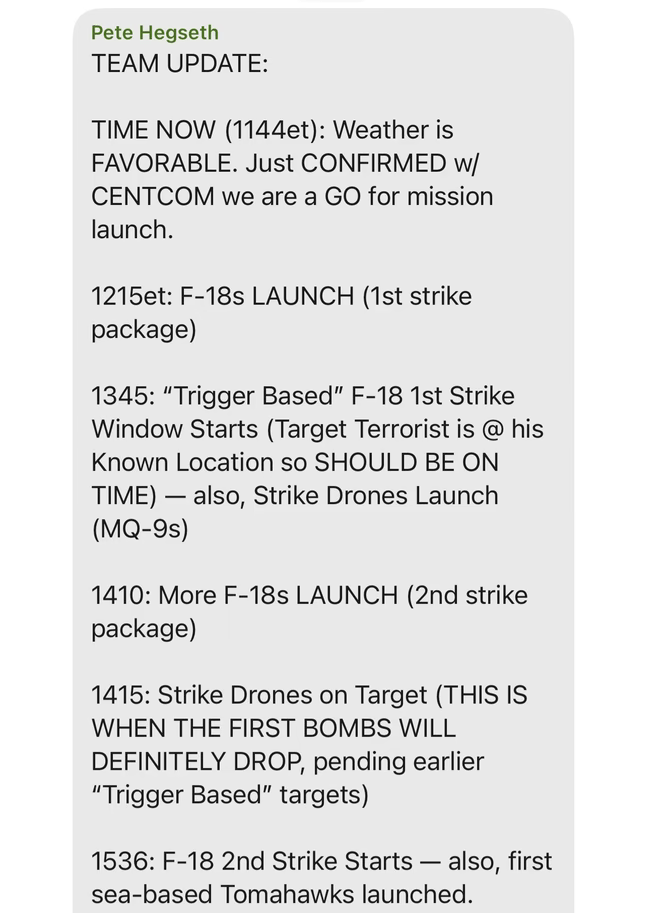

The messages couldn’t be clearer. Details of precise strike timing, delivered just hours before bombs actually dropped, along with specific weapons information — information that anyone with even passing familiarity with classified material (or basic common sense) would recognize as obviously classified. Even Fox News’ own national security reporter noted that every expert she spoke to said, if anything, what Hegseth texted was actually worse than what is commonly referred to as “war plans.”
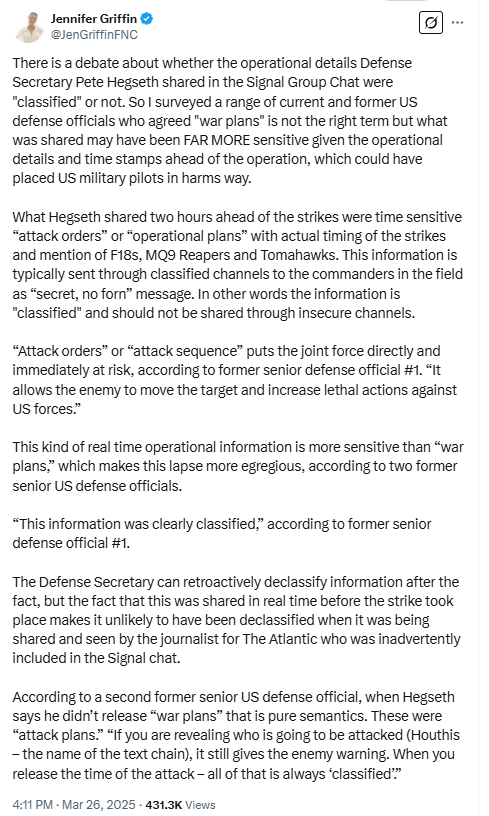
The key bit from that:
“Attack orders” or “attack sequence” puts the joint force directly and immediately at risk, according to former senior defense official #1. “It allows the enemy to move the target and increase lethal actions against US forces.”
This kind of real time operational information is more sensitive than “war plans,” which makes this lapse more egregious, according to two former senior US defense officials.
But rather than acknowledge the obvious, the administration doubled down on increasingly desperate semantic gymnastics. Their primary defense? That the Atlantic’s headline called them “attack” plans rather than “war” plans — as if this distinction somehow negated the sharing of classified military operations in an unsecured chat group that included a journalist. The semantic games only got more desperate from there:
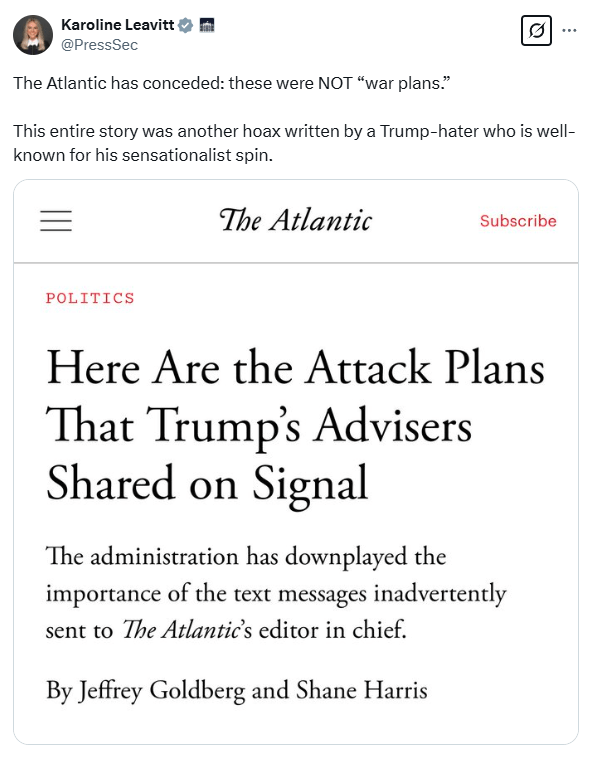
That’s White House Press Secretary Karoline Leavitt pretending that because The Atlantic called them “Attack Plans” instead of “War Plans” it was some sort of concession, even though (as noted above) experts point out this is worse and more egregious.
We’ve written a few times now about how the administration has been playing cutesy semantic games in court, in which they act like they think playing obvious word games is some sort of magic loophole away from accountability. This is more of that, but to the press. As with courts, no one but the dumbest MAGA faithful are buying this nonsense. THEY STILL WERE PLANNING AN ATTACK INCLUDING CLASSIFIED INFO VIA SIGNAL. The fact that they accidentally added a journalist was only worth noting in the sense that that’s how we know about it. The existence of the Signal chat is the first problem.
Others in the administration really leaned in on this “no war plans” semantic game:
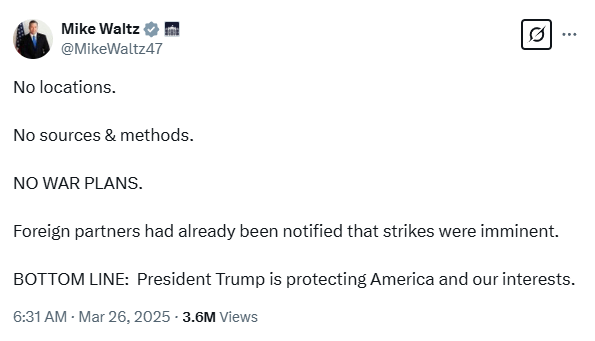
This is again, utter nonsense. It was texting clear details of a military operation before it occurred. It included details of weapons being used and timing. No one — NO ONE — thinks that this is acceptable or normal. Not even this crew now weakly trying to defend it.
But the administration’s semantic tap dance around “war plans” versus “attack plans” isn’t just missing the point — it’s actively trying to distract from something far more serious: evidence of potential war crimes. The Signal chat reveals senior administration officials deliberately targeting a civilian residential building, with full knowledge of its non-military status.
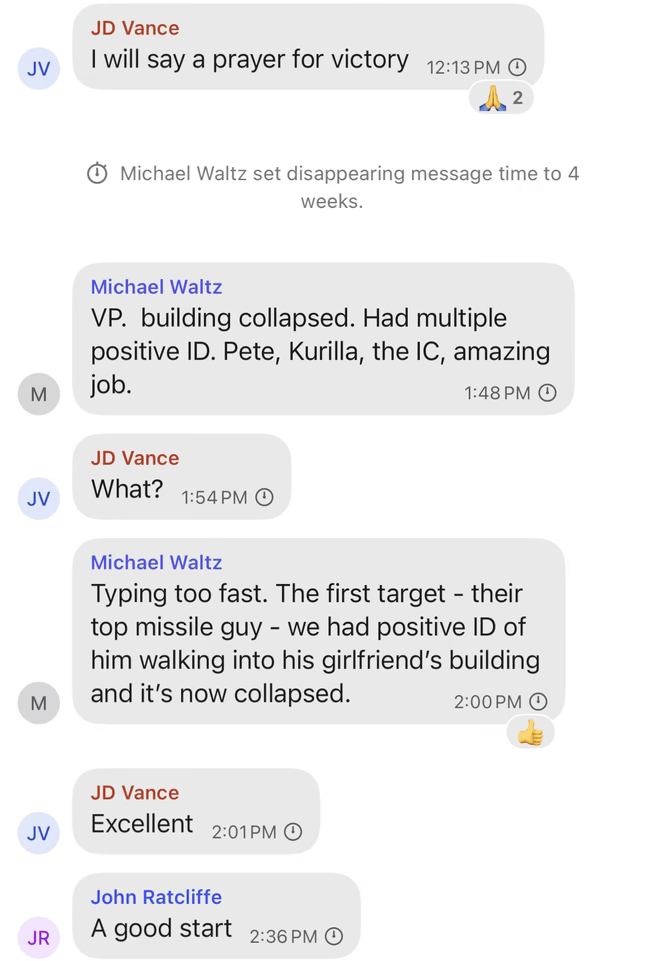
Let that sink in: they authorized bombing a civilian apartment building because a target’s girlfriend lived there. This isn’t just reckless — it’s a likely violation of international humanitarian law, which explicitly prohibits attacks directed at civilian objects. The fact that these officials casually discussed targeting civilian infrastructure in an unsecured chat group — while including a journalist by mistake — demonstrates a shocking combination of moral bankruptcy and operational incompetence.
This reckless disregard for both operational security and international law isn’t just dangerous — it’s potentially criminal. And while the administration tries to deflect with absurd arguments about the difference between “war” and “attack” plans, the reality is that they’ve provided documentary evidence of planning what appears to be a war crime, sharing classified operational details in an unsecured channel, and then lying about it to Congress.
For an administration that campaigned on bringing back competence and accountability to government, they’ve instead demonstrated they can’t be trusted with either classified information or military power.
Filed Under: attack plans, international humanitarian law, jd vance, jeffrey goldberg, john ratcliffe, mike waltz, pete hegseth, signal chat, tulsi gabbard, war crimes, war plans, yemen












